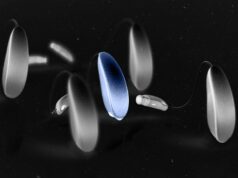Crestor (rosuvastatin) is a prescription drug that’s used to treat high cholesterol levels and help prevent heart disease. Crestor can cause side effects that range from mild to serious. Examples include headache, nausea, and constipation.
Crestor is used along with diet or other treatments to lower certain blood lipid (fat) levels in adults and certain children.* Conditions it’s used to help manage include:
This drug is also used to:
- reduce the risk of some cardiovascular (heart or blood vessel) problems, including:
- decrease the need for certain blood vessel procedures in the future
* Crestor is prescribed for adults and certain children with familial hypercholesterolemia. For the other conditions listed above, Crestor is only prescribed for adults.
Crestor comes as a tablet you swallow. It contains the active ingredient rosuvastatin. (An active ingredient is what makes a drug work.)
Keep reading to learn about the common, mild, and serious side effects that Crestor can cause. For a general overview of the drug, including details about its uses, see this article.
Some people may experience mild to serious side effects during Crestor treatment. Examples of the drug’s commonly reported side effects include:
* To learn more about this side effect, see the “Side effects explained” section below.
Mild side effects have been reported with Crestor. These include:
In most cases, these side effects should be temporary. And some may be easily managed. But if you have symptoms that are ongoing or bother you, talk with your doctor or pharmacist. And do not stop taking Crestor unless your doctor recommends it.
Crestor may cause mild side effects other than those listed above. See the drug’s prescribing information for details.
* To learn more about this side effect, see the “Side effects explained” section below.
Serious side effects have been reported with Crestor. These include:
If you develop serious side effects while taking Crestor, call your doctor right away. If the side effects seem life threatening or you think you’re having a medical emergency, immediately call 911 or your local emergency number.
* To learn more about this side effect, see the “Side effects explained” section below.
Note: After the Food and Drug Administration (FDA) approves a drug, it tracks and reviews side effects of the medication. If you’d like to notify the FDA about a side effect you’ve had with Crestor, visit MedWatch.
Get answers to some frequently asked questions about Crestor’s side effects.
How do side effects of Crestor in males compare with those reported in females?
In Crestor studies males and females* reported the same side effects.
Crestor is not recommended for use in females during pregnancy due to the risk of side effects in a developing fetus. See the “Warnings for Crestor” section below for more information.
If you have questions about specific side effects of Crestor, talk with your doctor or pharmacist.
* In this article, we use the terms “male” and “female” to refer to someone’s sex assigned at birth. For information about the difference between sex and gender, see this article.
Can Crestor 10 mg cause more side effects than Crestor 5 mg?
It’s possible but not likely. In studies of the drug, most common side effects occurred at similar rates for 5-mg versus 10-mg doses. But there was a slightly higher rate of weakness reported among those taking the 10-mg dose compared to the 5-mg dose.
How you react to a certain dosage of a drug depends on individual factors such as your age, other medications you take, your ethnicity, and your overall health.
Crestor’s effects are stronger in people of Asian descent. This is because there are higher levels of the drug in their blood. If you’re of Asian descent, tell your doctor. They’ll likely start you on a lower dose of Crestor.
Talk with your doctor or pharmacist if you’re concerned about dosage-based side effects of this drug.
Do side effects of Crestor go away? Does Crestor cause long-term side effects?
Most people taking Crestor have mild side effects which ease as they continue taking the drug. But in Crestor’s studies, there were rare cases of people who experienced long-term side effects. These are side effects that may start at any time you’re taking the drug, even if you’ve taken it for a long time. It also includes side effects that may not go away, even after you stop taking Crestor.
Possible long term side effects include:
Although rare, you may have an increased risk for certain long-term side effects based on certain factors such as:
- being age 65 years or older (there may be a higher risk of muscle-related problems based on how well your kidneys work)
- other medications you take
- other health conditions you have
If you’re concerned about long-term side effects from Crestor, talk with your doctor or pharmacist. They can review your health and medical history and discuss your risks with you. In some cases, they may suggest a different, safer treatment option for you.
Are side effects of Crestor in older adults different than those seen in younger adults?
It’s possible. In studies of Crestor, older adults (ages 65 years and above) had similar side effects to younger adults taking the drug. But older adults may have a higher risk of muscle-related side effects, such as rhabdomyolysis, from Crestor. This is because their kidneys may not work as well, which can cause the drug to stay in their body for a longer period of time.
If you have questions about side effect risks based on your age, talk with your doctor. They can help determine whether Crestor is right for you.
No, teeth-related side effects were not reported in Crestor studies. In fact, a 2020 review
For more information about the effects of Crestor on your teeth, talk with your doctor or pharmacist.
Learn more about some of the side effects Crestor may cause.
Nausea
You may have nausea while taking Crestor. This was a common but mild side effect of the drug reported in studies.
Nausea may also be related to other side effects of Crestor or caused by other medications you’re taking. If you experience abdominal pain, dark urine, or jaundice (yellowing of the skin and the whites of the eyes) with nausea or vomiting, call your doctor right away. These may be signs of liver damage, a serious side effect of Crestor.
What might help
If you have mild nausea symptoms, talk with your doctor or pharmacist. They can determine the cause and may suggest ways to help manage mild nausea. Tips may include:
- drinking plenty of fluids
- avoiding spicy foods
- avoiding strong odors or scents
If you have severe nausea or other symptoms, such as abdominal pain or dark urine with nausea, call your doctor right away. They’ll order tests to check your liver function and decide whether Crestor is safe for you.
Constipation
You may have constipation while taking Crestor. This was a common but mild side effect in Crestor’s studies. Keep in mind, this side effect may also be caused by other medications you’re taking.
What might help
In most cases constipation with Crestor is mild and your doctor may suggest ways to help manage it, such as:
- eating more high fiber foods
- drinking more water
- limiting alcohol consumption
- getting plenty of exercise
If you have constipation that’s ongoing or bothersome, call your doctor. They may have other suggestions to ease this side effect.
Muscle pain
Muscle pain is a common and usually mild side effect of Crestor. But in rare cases, serious muscle problems were reported in the drug’s studies. These include:
What might help
If you experience muscle pain, weakness, or tenderness while taking Crestor, call your doctor. They can check for the cause. For mild muscle pain, they may try lowering your dose of Crestor to see if it helps.
If you have serious muscle pain, call your doctor right away. They’ll likely check to see if you have more severe muscle damage, such as rhabdomyolysis. They may have you stop taking Crestor and switch you to a safer treatment option.
Headache
Headaches were a common but mild side effect reported in Crestor’s studies. But keep in mind that other drugs you may be taking or other health conditions you may have could also cause headache.
What might help
If you have headaches while taking Crestor, tell your doctor. For mild cases they may suggest:
- taking an over-the-counter pain reliever, such as Advil (ibuprofen) or Tylenol (acetaminophen)
- taking a warm bath
- lying down in a quiet place
- placing a cold pack on your forehead for 15 minutes
For a severe headache, call your doctor right away. They can check for the cause and determine whether it’s safe for you to continue taking Crestor.
Allergic reaction
Like most drugs, Crestor can cause an allergic reaction in some people. Symptoms can be mild to serious and can include:
- skin rash
- itchiness
- flushing (temporary warmth, redness, or deepening of skin color)
- swelling under your skin (usually in your eyelids, lips, hands, or feet)
- swelling of your mouth, tongue, or throat, which can make it hard to breathe
What might help
If you have mild symptoms of an allergic reaction, such as a mild rash, call your doctor right away. They may suggest a treatment to manage your symptoms. Examples include:
If your doctor confirms you’ve had a mild allergic reaction to Crestor, they’ll decide if you should continue taking it.
If you have symptoms of a severe allergic reaction, such as swelling or trouble breathing, call 911 or your local emergency number right away. These symptoms could be life threatening and require immediate medical care.
If your doctor confirms you’ve had a serious allergic reaction to Crestor, they may have you switch to a different treatment.
Keeping track of side effects
During your Crestor treatment, consider taking notes on any side effects you’re having. You can then share this information with your doctor. This is especially helpful when you first start taking a new drug or using a combination of treatments.
Your side effect notes can include things such as:
- what dose of the drug you were taking when you had the side effect
- how soon you had the side effect after starting that dose
- what your symptoms were
- how your symptoms affected your daily activities
- what other medications you were taking
- any other information you feel is important
Taking notes and sharing them with your doctor will help them learn more about how Crestor affects you. They can then use this information to adjust your treatment plan if needed.
Crestor may not be right for you if you have certain medical conditions. This is known as a drug-condition interaction. Other factors may also affect whether this drug is a good treatment option for you. Talk with your doctor about your health history before starting Crestor. Factors to consider include those described below.
Liver problems. Crestor may cause liver problems. These include elevated liver enzymes, jaundice (yellowing of the skin and the whites of the eyes), hepatitis, and in rare cases severe liver damage. Before staring Crestor, tell your doctor about any liver problems you have. They can order tests to check your liver function and decide whether Crestor is safe for you to take.
Your doctor will monitor your liver condition while you’re taking Crestor. If you have signs of liver damage such as abdominal pain or dark urine, call them right away.
Older age. If you’re age 65 years or older, you may have a higher risk of muscle pain with Crestor. This is because as you age your kidneys may not work as well. This can cause Crestor to stay longer in your body, increasing your risk of side effects. Your doctor may start you on a lower dose of Crestor to see how you do with treatment.
Kidney problems. If you have severe kidney problems, tell your doctor. Damaged kidneys have a harder time removing Crestor from your body, which can increase your risk of certain side effects of the drug. If you have severe kidney problems, your doctor will likely order a kidney function test to determine whether Crestor is safe for you. In some cases, they may start you on a lower dose of the drug and monitor your kidney function while you’re taking it.
Diabetes. Taking Crestor can increase your blood sugar level. If you have diabetes, tell your doctor. They’ll decide if it’s safe for you to take this medication. If they do prescribe Crestor for you, they may have you monitor your blood sugar more closely while you’re taking it.
Allergic reaction. If you’ve had an allergic reaction to Crestor or any of its ingredients, your doctor will likely not prescribe it for you. Ask them about other medications that might be better options.
Asian descent. In Crestor studies, people of Asian descent were more sensitive to the effects of the drug, which increased their risk of side effects. If you’re Asian, your doctor may start you on a lower dose of Crestor.
Thyroid condition. If you have a thyroid condition that’s not well managed, your risk of muscle-related side effects from Crestor is increased. Tell your doctor if you have a thyroid condition. They’ll likely treat that condition before prescribing Crestor for you.
Alcohol and Crestor
There are no known interactions between Crestor and alcohol. But drinking alcohol can affect your liver and taking Crestor can also cause liver-related problems. If you drink alcohol, ask your doctor how much, if any, is safe to consume.
Pregnancy and breastfeeding while taking Crestor
It’s not recommended to take Crestor if you’re pregnant. The drug may cause fetal harm. If you’re pregnant or planning to become pregnant, tell your doctor. They’ll discuss with you the safety of taking Crestor during this time.
It’s also not recommended to breastfeed while being treated with Crestor. This is because the drug passes into breastmilk and may cause side effects to a breastfed child. If you’re taking Crestor, your doctor will likely suggest an alternative way to feed your baby.
Crestor is used to lower high cholesterol levels and reduce the risk of heart disease. The drug may cause mild to serious side effects, though serious side effects are less common.
If you have questions about side effects that Crestor can cause, talk with your doctor. Examples of questions to help get you started include:
- If I have hepatitis, do I have a higher risk of liver-related side effects from Crestor?
- Does my risk of side effects depend on my dosage of Crestor?
- How do the side effects of Crestor compare to Lipitor?
To learn more about Crestor, see these articles:
To get information on different conditions and tips for improving your health, subscribe to any of Healthline’s newsletters. You may also want to check out the online communities at Bezzy. It’s a place where people with certain conditions can find support and connect with others.
Disclaimer: Healthline has made every effort to make certain that all information is factually correct, comprehensive, and up to date. However, this article should not be used as a substitute for the knowledge and expertise of a licensed healthcare professional. You should always consult your doctor or another healthcare professional before taking any medication. The drug information contained herein is subject to change and is not intended to cover all possible uses, directions, precautions, warnings, drug interactions, allergic reactions, or adverse effects. The absence of warnings or other information for a given drug does not indicate that the drug or drug combination is safe, effective, or appropriate for all patients or all specific uses.










